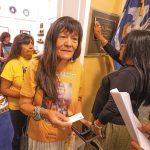
50 Years Ago: Orientation held for members of 1971 Navajo Tribal Council
A kind of unofficial orientation occurred last week for members of the 1971 Navajo Tribal Council, organized by Council officials to prepare new members for what to expect when they start their new jobs. All new delegates showed up as well as a few old-timers who apparently either wanted a chance to meet the “newbies” or get a refresher on how the Council works.
Howard Gorman, the long-time representative for Ganado Chapter, was there and he said he was impressed with the new members. “They seem to know a lot about how our government operates so we should be able to tackle some of the major problems facing the tribe as soon as everyone is sworn in next month,” he said.
But exactly which of these problems will be discussed is still up in the air since the tribe’s new chairman, Peter MacDonald, is still finalizing his priorities for the first year of his administration.
He has talked in general terms that his top priorities will be in the area of economic development and finding a solution to the century-old land dispute. The new council members, according to the Times, seem eager to work with the new chairman, who has been spending a lot of his time reviewing applications from people, both Navajo and Anglo, who want to be part of his administration.
The reports from inside his camp, however, is that one of his goals is to place Navajos in most of these positions and given his past decisions as ONEO director, a lot of these will be people he knows that or who have had important positions in his campaign.
Three Navajo couples from Shiprock – Mr. and Mrs. Hugh Plummer, Mr. and Mrs. Peter Blackhorse and Mr. and Mrs. Fred Yazzie – have filed a complaint in the Santa Fe State District Court trying to get the state to return the state income tax they paid this past year. Tribal officials say this has the potential, if decided in their favor, of saving tribal members who live on the New Mexico portion of the Navajo Reservation tens of dollars a year.
There is a question, however, on whether this case will go anywhere in light of a decision the year before that upheld the right of the state to impose the tax. That suit was filed by a Zuni couple who stipulated that their salary working for Zuni Pueblo could not be viewed as property.
The couple lost the case in a decision that said the state had the right to impose an income tax as long the tax did not interfere in the workings of the tribal government. The suit by the Shiprock couples, however, claims the state income tax does interfere with the Navajo government because it “interferes and denies the authority of the Navajo government over the affairs of Navajos living within the interior boundaries of their reservation,” as stated in the 1868 treaty between the Navajos and the federal government.
Tribal officials felt strongly about the sovereignty of their government but there were also discussions going on within the tribe about imposing a tribal income tax, which would be hard to do if the state income tax remained in effect. Their attorney was Donald Juneau, who was working for DNA-People’s Legal Services in Shiprock.
The Nakai administration had tried unsuccessfully several times to shut down DNA but now found itself having to work with the legal aid agency to stop the state.
It seems that Raymond Nakai, the outgoing chairman for the Navajo Tribe, has a lot in common with Donald Trump. This week, with the approval of Nakai, a number of outgoing members of the Council filed a complaint asking that the planned inauguration for MacDonald and the 74 members of the tribal council be postponed for six months to give a federal grand jury time to investigate irregularities that occurred in the election for chairman.
The group is claiming that ballots ran out for chapters in which Nakai was favored and that too many Nakai votes were rejected by election officials. The complaints went nowhere and the attempt to postpone the inauguration also went nowhere.
There were also rumors that MacDonald violated tribal election laws by accepting contributions from non-Navajos. Tribal law prohibited non-Navajos from contributing in any way to any candidate running for office. The reason for the law was obvious. People feared that outside interests would contribute large sums of money to a candidate to either assure they get preferential treatment during his administration or that he take a certain approach on some future issue.
For example, there were rumors that off-reservation liquor dealers would donate to both candidates to make sure that no laws would be passed allowing the sale of liquor on the reservation. No candidate escaped these rumors and over the years details would come out in court cases or interviews that MacDonald and others were not opposed to accepting an illegal contribution here and there.
For example, officials for Frazier Entertainment, which got the contract each year for the Navajo Fair and Fourth of July events, once testified in a deposition that they regularly donated money to all of the candidates running for chairman to keep in the good graces with the tribal government.
Another common practice was for non-Indians to give the money to tribal members who would donate the funds to a campaign after quietly telling the candidate or one of his trusted aides privately where the contribution was really coming from. This was hard to prove and, although everyone seemed to be aware it was occurring, I don’t remember anyone filing a formal complaint on the matter.
I always wondered how far this policy was enforced. For example, campaigns would sell food and drinks to raise money and it seemed that non-Navajos were allowed to buy items even though a portion of every transaction was placed into campaign coffers.
Eventually tribal election officials would turn their back on this saying they had serious doubts that the dollar or two the campaign earned by selling a hot dog to a non-Navajo would not influence candidates to do anything.








 Highway 264,
Highway 264, I-40, WB @ Winslow
I-40, WB @ Winslow